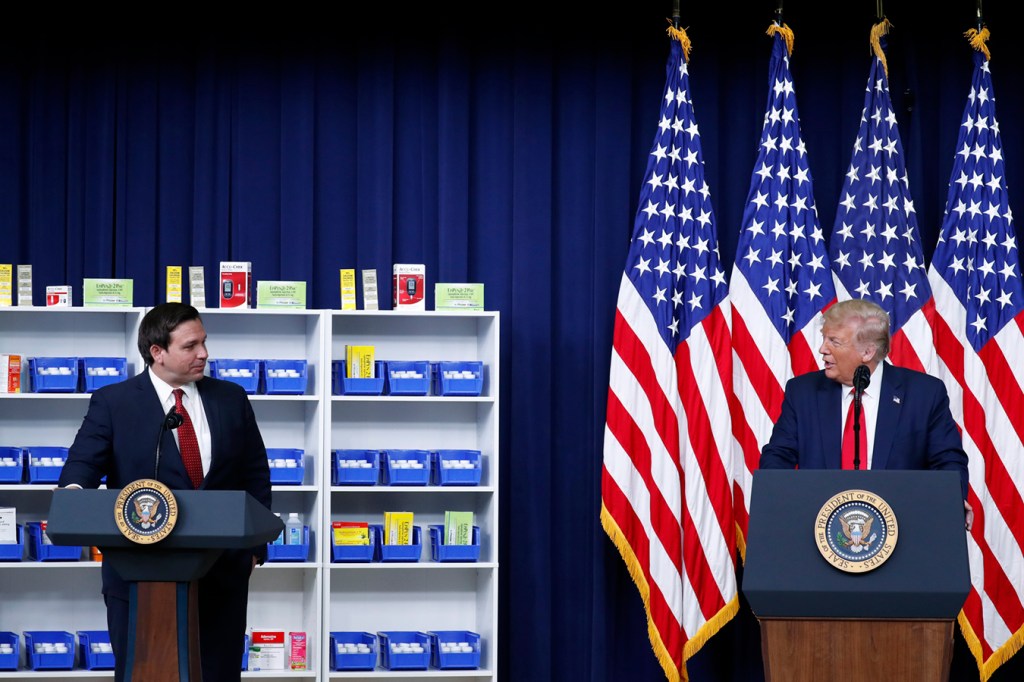Florida’s plan to import cheaper prescription drugs from Canada — designed by Gov. Ron DeSantis and endorsed by President Donald Trump — has tasted its first bitter pill.
No private firms bid on Florida’s $30 million contract to set up and operate a drug importation program. Bids were due at the end of September.
The setback is likely to delay by at least several months Florida’s effort to become the first state to import drugs.
A spokesperson for the Florida Agency for Health Care Administration said the state is exploring its options. “The agency remains confident it will find a qualified vendor soon,” the spokesperson said. The state had planned to award a contract to a private vendor in December.
The disclosure of no bidders comes less than a month after the Trump administration cleared the way for states to apply for federal permission to set up an importation program — reversing nearly two decades of U.S. policy.
A 2003 law allows drug importation from Canada, but only if the head of the federal Department of Health and Human Services deems it safe and cost-effective. HHS Secretary Alex Azar made that declaration Sept. 24 and approved final rules for such initiatives.
Jane Horvath, a health consultant in College Park, Maryland, said potential bidders on the Florida contract were likely put off because the final federal rules were not set until late September. And private firms didn’t want to bid on a contract that would have to change if the Florida rules conflicted with those from Washington, she said.
Several inconsistencies are apparent between the Florida plan and what is allowed under the HHS final rules, she said. For example, Florida aims to give bonus-scoring points to contractors that repackage and relabel drugs in Florida, which is not allowed under the federal rules.
Another problem is that the private contractor has to determine which prescription drugs will produce the most savings for Florida’s Medicaid program, which is difficult since Medicaid rebates and other discount pricing are confidential.
“It could be that the $30 million contract is not enough either,” Horvath said.
Drug prices are lower in Canada because the country limits how much drugmakers can charge for medicines. The United States lets drugmakers and their distributors dictate prices.
Trump, who made lowering prescription drug prices a key campaign issue in 2016, has promoted importation, especially in messages geared to seniors during his reelection bid.
Critics say importing drugs from Canada would threaten the drug supply with counterfeit products. Because high-cost biologic drugs, including insulin, and intravenously injected medicines are not allowed to be imported under current law, the strategy could have limited impact.
Even with HHS backing, drug importation faces several challenges. Most notably, Canada has vowed to stop any effort that would exacerbate drug shortages there, which could make it challenging to identify a Canadian exporter. And the pharmaceutical industry opposes the program and is likely to sue to stop it.
Florida plans to set up an importation program to help lower drug prices for people covered by state programs such as Medicaid and the Corrections Department. The state has projected savings of up to $150 million a year.
The federal rules take effect Nov. 30, which is when states can formally apply to HHS to set up their program.
A chief architect of Florida’s importation plan, Mary Mayhew, who was secretary of the Florida Agency for Health Care Administration, resigned in September to become CEO of the Florida Hospital Association.
Mayhew refused to comment for this story.
Vermont, Colorado, Maine, New Hampshire and New Mexico are also devising programs to import drugs from Canada.
Colorado officials plan to seek out private contractors for that state’s program in 2021, and they hope to get final federal approval by summer 2022, officials said during a recent call with stakeholder groups.
Colorado plans to allow consumers to get drugs from Canada at their U.S. pharmacy or through mail order. It estimates residents could save an average of 61% off the price of medicines in Colorado today.
It’s unclear what impact the outcome of the presidential election will have on drug importation. Democratic nominee Joe Biden said he supports importing drugs from Canada. But, if elected, he is also likely to review many of the Trump administration’s actions.
This story was produced by Kaiser Health News, an editorially independent program of the Kaiser Family Foundation.
